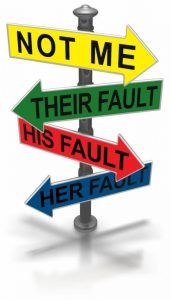 There is an interesting and telling TV commercial currently being broadcast. The commercial shows a middle aged man walking off of a sporting field holding the hand of a child.
There is an interesting and telling TV commercial currently being broadcast. The commercial shows a middle aged man walking off of a sporting field holding the hand of a child.
The child is holding a trophy that proudly displays the title “Participant”. The man shakes his head and states: “Participant! They won every game.” He then pulls off the title and writes in “Champion”.
The microcosm of this commercial demonstrates the major shift in attitudes occurring in our workforce. And as those shifts occur, we often find that our organizations suffer from a crisis of personal accountability, which makes the effort of either changing or bolstering a culture of accountability difficult and more prolonged.
To deal with this crisis, current leaders and managers often revert to old fashioned command and control structures and methodologies in order to drive accountability within an organization. They simply expect and demand accountability, but do not engage in it.
We Are Not Just “Participants” …
Let’s be honest. In business and in much of life, we are not just participants. There are winners and those who do not win. There are those who succeed in business and those who fail. There are attorneys who “win” in court and those who do not.
 It is important to note that we are not talking about winners and losers, but achievement and failure. it is precisely that difference, and the individual need to personally be accountable, that often drives someone who fails, to ultimate success.
It is important to note that we are not talking about winners and losers, but achievement and failure. it is precisely that difference, and the individual need to personally be accountable, that often drives someone who fails, to ultimate success.
What really defines and creates a culture of accountability in a business? It is a type of culture where people demonstrate high levels of ownership to think and act in the manner necessary to achieve organizational results. The defining characteristic of this type of culture is that people voluntarily assume their own accountability.
A Culture Of Accountability …
 In this culture, employees at every level of the organization are personally committed to achieving key results targeted by the team or organization; reporting proactively and following up constantly, diligently measuring their own progress because they have internalized their commitment to achieving results.
In this culture, employees at every level of the organization are personally committed to achieving key results targeted by the team or organization; reporting proactively and following up constantly, diligently measuring their own progress because they have internalized their commitment to achieving results.
Their mantra: “What else can I do to achieve the desired results“; leads them to continually find answers, overcome obstacles, and succeed in the face of problems that occur. And, as you might expect, everyone holds everyone accountable for results.
 Authors Roger Connors and Tom Smith have written and studied about accountability for years. One of the stories they use as an example is The Wizard of Oz.
Authors Roger Connors and Tom Smith have written and studied about accountability for years. One of the stories they use as an example is The Wizard of Oz.
The “participants” think of themselves as victims of circumstances, skipping down the yellow brick road, where the all-powerful Wizard will grant them courage, heart, wisdom and the means to succeed.
Even Dorothy believes she must travel the yellow brick road just to go home.
A Very Thin Line …
 Successful managers recognize that the difference between success and failure; between great companies and ordinary, is a very thin line.
Successful managers recognize that the difference between success and failure; between great companies and ordinary, is a very thin line.
And whether or not the organization operates above or below that line is highly determinate of success or failure.
People and organizations operating below the line consciously or unconsciously avoid accountability for results.
Falling into a victimized cycle, ignoring accountability, ducking responsibility, blaming others for their errors, asking others to tell them what to do, developing their story for why they are not at fault, and waiting for some hoped for miracle to be dispensed by the Wizard.
It’s Easy To Criticize …
 While it’s easy to criticize those who play to participate rather than those who play to win, it is important to examine the culture that managers and business owners create.
While it’s easy to criticize those who play to participate rather than those who play to win, it is important to examine the culture that managers and business owners create.
The role of the Wizard is often played by those that have a high need for personal verification at the expense of others, creating this culture of fear and eventually apathy.
A culture of accountability begins at the top and is driven deeply into the organization both by educating everyone on what is acceptable behavior and what is not, but mostly by the most senior management in the company living, every day, the culture they espouse. In our practice we see the results when words and actions are in conflict.
Who Really Failed? …
 In a letter to a small group of private investors by a company CEO, he discusses the reasons for the poor performance of the company.
In a letter to a small group of private investors by a company CEO, he discusses the reasons for the poor performance of the company.
In discussing the failures, he cites an “unreliable website and lack of experienced and dedicated management”. In another part of the business, he blames the failure on “gross mismanagement of sales.” While he was the senior manager responsible for all of these activities, his role is never mentioned.
In another case, the CEO of a company constantly micromanages his employees, blaming them for every real or imagined error, many his own, while, insisting that his company difficulties are the result of not being able to hire “A” employees.
When Andy Grove Was CEO At Intel …
In the 1980’s I had the privilege of working at Intel when Andy Grove was CEO. While there have been books written both by and about Andy and the Intel culture; at the bottom line, Grove is the poster child for demonstrating how it is possible to be a tough and effective leader without being an ass.
In part, because he was one of the most honest executives around, about both his own errors and those made by others. Very few executives were as honest about their own mistakes and worked to correct them so rapidly.
How To Build A Culture Of Accountability …
 How does one establish and reside in a culture of accountability?
How does one establish and reside in a culture of accountability?
Look to the Wizard of Oz.
- Don’t get stuck on the yellow brick road
- Don’t blame others for your own circumstances
- Don’t wait for wizards to wave their magic wands
- And never expect for your problems to disappear.
And by practicing and managing with personal accountability, the label on your particular “trophy” will say a lot more than participant.


